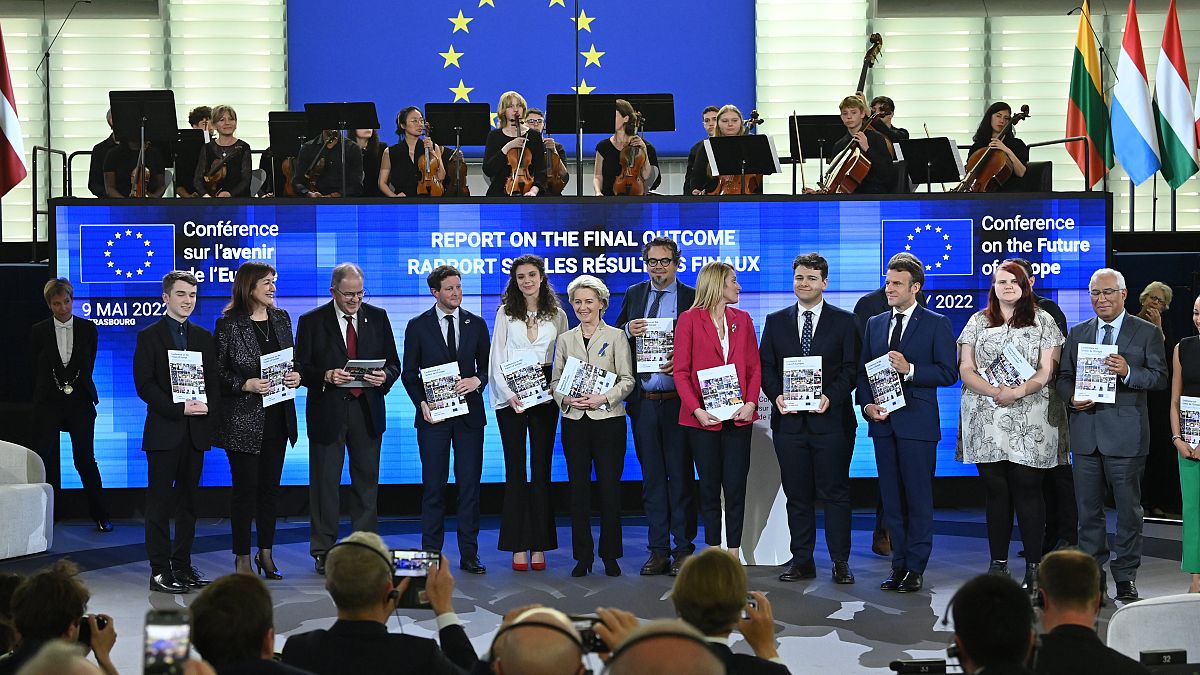The idea is to speed up EU decision making.
European Commission President Ursula von der Leyen says she backs reforming the EU by getting rid of unanimous voting in some areas.
Critics of the EU say the requirement to reach agreement with all 27 member states slows down decision making, notably with the Ukraine war.
Von der Leyen, speaking before the European Parliament during the closing ceremony of a conference on Europe's future, said she was in favour of reforming the EU treaties "if need be".
"The point is, you have told us where you want this Europe to go. And it is now up to us to take the most direct way there, either by using the full limits of what we can do within the Treaties, or, yes, by changing the Treaties if need be," von der Leyen said.
She said Europe should play a greater role in health and defence, and improve the way its democracy works "on a permanent basis".
"I will always be on the side of those who want to reform the European Union to make it work better," von der Leyen said.
French President Emmanuel Macron, whose country holds the rotating EU Council Presidency, suggested that member states discuss reforming the treaties at the Council summit in June.
Stating that Europe has shown its effectiveness during the pandemic and the war in Ukraine, Macron said the new challenge is "to be just as effective in times of peace and without a crisis".
"Being effective means we have to decide quickly in a united manner, invest massively in the right things, and not leave anyone behind. That's what it is to be European. Faced with this, we also have to reform our texts."
"One of the avenues of this reform would be a convention to revise the treaties," Macron said, adding that he approved of the idea.
Von der Leyen said in her speech that she was in favour of changing the EU's requirement for unanimous agreement among member states on certain issues.
"I have always argued that unanimity voting in some key areas simply no longer makes sense if we want to be able to move faster," said the Commission president.
She also said the EU should "give citizen panels the time and the resources to make recommendations before we present key legislative proposals" to improve democracy in the bloc.
'Ukraine already a member of the European family'
On Ukraine, von der Leyen said that the country's president, Volodymyr Zelenskyy, wanted to virtually hand over more than 5,000 pages of answers to a questionnaire to begin the EU accession process. She said to Ukrainians that the future of Europe was their future.
Macron said: "Ukraine, because of its struggle and because of its courage, is already a member of our Europe, our family, our union."
But, he said, accession could take several years or even several decades "unless we decide to lower the standards for accession and rethink the unity for our Europe."
Macron suggested a "European community" as a new space for political cooperation on the continent.
"This new European organisation would allow democratic European nations adhering to our core values to find a new space for political cooperation, cooperation in security, energy, transport, infrastructure investment and in the movement of people, and in particular our youth," he said.
Their comments came as a conference on the bloc's future came to an end.
European citizens, MEPs, representatives from the EU Council and Commission as well as from member states approved more than 300 proposals in a special session in Strasbourg last week. These proposals were submitted to EU leaders on 9 May.
Not all countries are in agreement on changing the treaties just yet.
In a non-paper from Bulgaria, Croatia, the Czech Republic, Denmark, Estonia, Finland, Latvia, Lithuania, Malta, Poland, Romania, Slovenia, and Sweden, the states wrote that while they do not exclude any options, "we do not support unconsidered and premature attempts to launch a process toward Treaty change".
"This would entail a serious risk of drawing political energy away from the important tasks of finding solutions to the questions to which our citizens expect answers and handling the urgent geopolitical challenges facing Europe."
